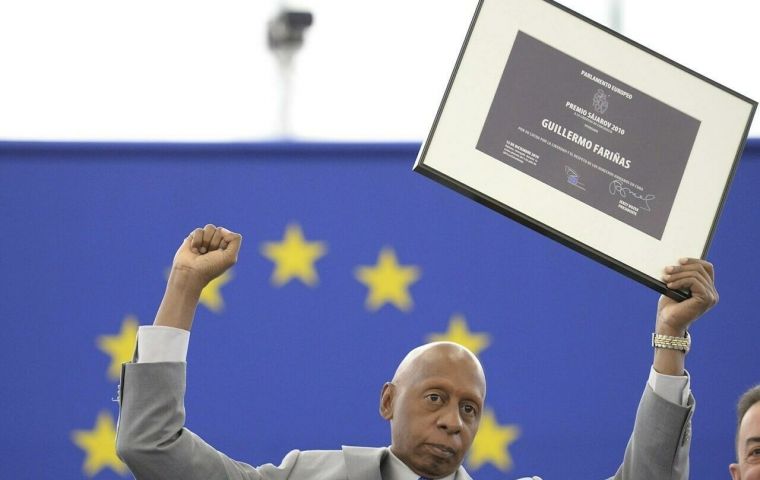
HAVANA, Nov 3 (NNN-MERCOPRESS) — A leading member of the Cuban opposition was set free, with restrictions, on Tuesday following his detention by the government in the city of Santa Clara where he lives.
“It’s all about 15 November” Guillermo Faríñas, the Sarajov Freedom Prize from the European Parliament, told the Spanish news agency EFE about the conversation he had with three security officers while held for several hours.
Fariñas is the coordinator of the illegal AntiTotalitarian United Front, FANTU, and considers he was arrested because the regime was interested in knowing whether he would attend the march organized by another illegal group Archipelago scheduled for Nov 15.
“They will find out on the 15th” underlined Fariñas
During his one day arrest the state security agents wanted to know about his comments on the social webs in solidarity with the promoters of the 15N march, which the Cuban regime has banned arguing it’s “illicit” and warned that there would be no concessions for nobody.
The organizers of the march have said that the purpose is to demand respect for human rights, liberation of political prisoners, and that solutions to differences should be done through democratic and peaceful means.
Fariñas who is currently under treatment for a bacteria in a kidney said the security agents tried to convince him to be interned in hospital.
“I think they are trying to have me in hospital on 15N, but we did not agree”, pointed out Fariñas who in 2010 was awarded the Sarajov Prize for his struggle in favor of freedom and human rights.
Last Sept 8 Fariñas was also under arrest for a few hours, a situation to which he has been accustomed.
Fariñas is one of the regime’s most notorious opposition members particularly because of the several hunger strikes to protest lack of freedom and abuses, the first of which was in 1995. The longest was in 2003, fourteen months, and the last in 2016, during 54 days, demanding an end to repression against dissidents.
For the Castro dynasty regime dissidents are labeled “counter revolutionaries” and “mercenaries” on the payroll of the United States interests. The regime also denies there are political prisoners in the island.
In July there were massive spontaneous protest marches in most of urban Cuba under the motto Motherland and Life, no longer the revolution’s Motherland or Death, which surprised, if not shocked the regime. All foreign communications were cut off and repression, according to witnesses was harsh. In the following weeks hundreds were arrested and sentenced, but the unrest seems to remain latent. — NNN-MERCOPRESS





